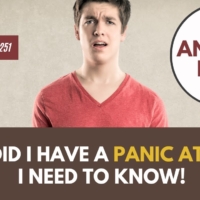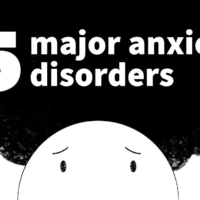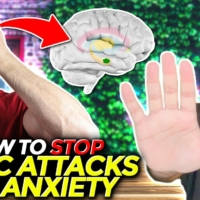8 Signs of an Anxious Attachment Style
(upbeat music) – [Narrator] Hey Psych2Go
Welcome back to another video, before we start, we’d
like to thank you all for the support that you’ve given us. Psych2Go mission is to make psychology and mental health more
accessible to everyone, and you help us do that, so thank you, now back to the video. Are you always insecure
about your relationships? Do you need constant reassurance from your partner or loved ones? Attachment theory
categorizes the way we act in relationships into three-man attachment styles, in today’s video, we will be focusing on the anxious attachment style, which according to mindbodygreen is a type of insecure attachment
style rooted in a fear of abandonment and insecurity
of being under-appreciated. The anxiety or insecurities you may feel in your relationship today may be due to an anxious attachment style
you developed as a child. Remember if you find yourself relating to the points we mentioned,
be kind to yourself, and know that you can always work towards improving your behaviors, with that said, let’s
look at the eight signs of an anxious attachment style.
Number one is feeling
insecure in relationships. Are you always worried
about not being good enough for your partner? Does it get in the way of your happiness? A sign of an anxious attachment style is feeling insecure in your relationships, and this insecurity may
manifest in several ways. For instance, you may find
yourself very reactive to your partner’s words and actions, or find that you need constant reassurance from your partner to feel okay.
Number two is, the looming fear of abandonment. Are you scared that your
partner will leave you even when nothing is wrong? This fear of abandonment
is pretty common for people with an anxious attachment. It’s likely stemming from
feelings of abandonment and insecurity about your
parents when you were a child. According to how Healthline
this fear and worry that your partner will leave you, often results in a tendency to become overly
dependent on your partner, which may negatively
impact your relationship and your emotional well-being. Number three is trust issues. You have a hard time
trusting your partner. Maybe you find it hard to
believe in your partner when they say they won’t leave you, or when your friends tell you that they truly care about you, whatever it is, this
difficulty to trust others may stem from a combination
of feeling insecure about your relationships, and fearing that your
partner or your friends are going to abandon you in time.
If it gets out of hand,
this distrust of others may result in losing your relationships. Number four is clinginess. Have other people called you clingy when it comes to you
and your relationships, maybe you’re over-reliant, or
overdependent on your friends, family, or partner. Unlike some of the other signs, clinginess can be a common
coping mechanism for fears that come with the
anxious attachment style. According to the attachment project, people with anxious
attachment develop clinginess because they’re afraid of being alone. Number five is emotional neediness. Do you always need other
people’s attention? According to Abby Moore from
Mindbodygreen, many people with an anxious attachment
style are emotionally needy because they did not receive the proper emotional nurturing
and security as a child.
This emotional neediness
may manifest into behaviors where they constantly seek reassurance, soothing, and attention from
the people in their lives. Number six, harsh reactions to criticism. Are you the type to
take criticism to heart? Does it have a strong
impact on your self-esteem? While it is not uncommon to
be sensitive to criticism those with an anxious attachment style might view criticism more intensely. Instead of seeing criticism
as a way to help you grow, you may take it as a rejection, and let it amplify your
fears and insecurities, which may ultimately
lead to low self-esteem.
Number seven is ambivalence
towards intimacy. Do you crave intimacy, or
do you find it overwhelming? Some people with anxious
attachments walk this fine line between craving and fearing
emotional and physical intimacy. And this perception of intimacy may be due to emotional neglect
during your childhood. So while you have a deep
craving for intimacy, you may not know how to, or be comfortable with accepting it. And number eight, feeling unworthy. Do you feel unworthy of love, or that you aren’t good
enough for your relationships? People with an anxious attachment may have low levels of self-esteem, and a negatively distorted
view of their self-worth.
This lack of self-esteem is
likely to stem from insecurities and fears of being abandoned, or unwanted by your parents or loved ones, which may lead to a belief
that you’re not worthy enough for your relationships. We hope you enjoyed learning
about some of the signs of an anxious attachment style. Do you relate to any of the
things we’ve mentioned above? Let us know in the comments below. If you found this video helpful, be sure to like and share this video with those who might benefit from it. Don’t forget to subscribe and
hit the notification bell icon to get notified whenever I
decide to post a new video. The references and
studies used in this video are added in the description below. Thanks for watching, and we’ll
see you in our next video.
The 𝗙𝗮𝘀𝘁 𝗕𝗿𝗮𝗶𝗻 𝗕𝗼𝗼𝘀𝘁𝗲𝗿 For A Healthy Brain Now there’s a fresh natural way for anyone to reactivate their natural brain cell protection mechanism and enjoy the life the way it’s meant to be lived. Boost your thinking levels, improve your concentration and focus, enhance mental performance, and even strengthen your immune system 𝗙𝗮𝘀𝘁 𝗕𝗿𝗮𝗶𝗻 𝗕𝗼𝗼𝘀𝘁𝗲𝗿.↯
















